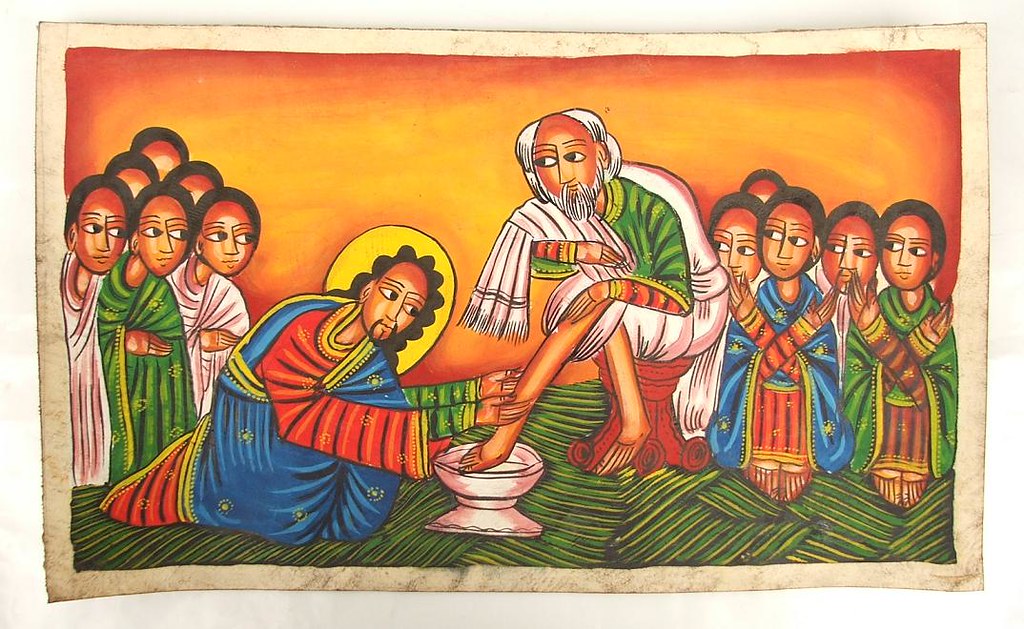 Below is really the best article by Valentin Tomberg on the differences between Indian Yoga and the Christian paths:
Below is really the best article by Valentin Tomberg on the differences between Indian Yoga and the Christian paths:
Just as it was necessary within the social order of India to build a bridge by means of the caste system between material man and spiritual man, and as it was necessary in Indian thought-life to bridge through theory the polarity of the abovementioned principles (Purusha and Prakriti), so in Yoga it was a question of actually treading the path which leads from the realm of matter to that of spirit. And that pathway is certainly taken, and many take it even today in those parts of the world.
Regarding Yoga now from this point of view - that it is not just a theoretical world of ideas, but a practical ordering of the relation between spirit and matter - there arises the question as to the manner in which this relationship is governed. We are faced with the question: What does the student of Yoga actually want to achieve ? What aim does his soul have in view ?
The goal of the Yoga student is to be freed from the bonds of the body, and essentially Yoga technique employs methods for breaking these bonds. These consist of a system of exercises along with a certain way of life which call forth changes in the human being, taking him further in the direction of this goal. The transformations striven for by repeated exercises and the definite life style of Yoga result in the formation of a kind of stream of forces which come from below and move upwards in the human organism; from the lower body up into the head.
This stream of forces moving from below upward (the so-called "Kundalini Fire") reaches the brain and crown of the skull and penetrates through them, causing consciousness to be loosened from the body and the experience of the desired state of freedom from earthly bonds. In this way through Indian Yoga, experiences are sought which arise in connection with a freeing from the body. This striving is a striving after freedom but in the sense of a freedom from the earth.
The practical aim of Yoga actually stands in polar opposition to the ideals of the representatives of Christian European culture. These representatives of the profound Christian spiritual life revealing itself in the past in the form of Rosicrucianism, strove also toward a practical goal, yet their goal is entirely different from that of Indian Yoga. For them the important thing is not to be freed from the earthly element, but to redeem everything earthly from evil.
The idea which forms the basis for this striving is not the opposition between spirit and matter, but rather the opposition between good and evil.
Christianity, not as a philosophical or theological teaching, but as a active spiritual force in the world, proceeds from the idea that evil has penetrated into the world and that error, sickness, and death are its results. Therefore it cannot be Christianity's task to retreat from that realm, but rather to conquer the evil which has given cause for error, suffering and death.
Before Christianity stands the lofty and distant goal of conquering death itself, not in the sense of fleeing into that realm where death no longer exists, but of conquering it in that place where it unfolds its greatest power. The victory over death in the realm of earthly life itself that is the goal of true Christianity. However, this goal must be reached through victory over evil. It is not a question of fighting against matter, for matter and nature are not in themselves evil. Rather they can be seen as victims of evil. The task of man, therefore, is not to wrestle with nature in order to free himself from her, but to struggle to purify her and set her free.
This goal of true Christianity finds expression in the image of the Washing of the Feet from the sublime Gospel of St. John. There Christ bends down to the lowly and even to the lowest of the low, the feet of which He washes. In this image, the idea is expressed that the Christ impulse has the task of enabling the 'low' to be purified: by going down oneself into the lowest regions of being in order to ennoble them.
Now there is nothing, either in man or nature, which cannot be transformed. Among the ways that this striving came to expression was in the misunderstood and misused Alchemy, widespread in Europe in the Middle Ages. The alchemists were wholly filled with the wish to transform the 'lower into a higher', and were convinced that this was just as possible in the case of metals and other substances as with the human soul forces.
Their efforts to transform base metals into precious ones were actually expression of a deeply inward permeation with the reality of the Christ Impulse. They strove to apply the great principle of Washing of the Feet, even in material processes in their laboratories ; and they did this - the original, true alchemists - because they had the actual experience: it is possible to transform the 'lower into the higher'. They expanded their inner experience into the outer realm of physical substances and forces.
The Alchemy of the Middle Ages is merely one especially conspicuous example of the working of the Christ impulse in man. There are many such examples. In all of them the main thing is that they give expression in various ways to the principle of the Washing of the Feet. This principle is actually the spiritual-moral foundation for any true Christianity. It is especially the basis of Christian Rosicrucianism.
While the objective of Indian Yoga is to create a stream of 'fire power' from below upward in the human organism with the purpose to experience the liberation of one's own soul, so in Christian Occultism the MAIN OBJECTIVE IS TO CREATE A STREAM OF 'LIGHT POWER' WHICH WORKS ABOVE DOWNWARDS. Meditation and other spiritual exercises of Christian Occultism have the task to allow the light which is kindled in the head to stream downward so that the unconscious life of human urges and instincts may be illuminated and ennobled. And the purification of human nature is the beginning of the purification of all Nature: that is, the beginning of the conquest of evil in the world.
Today, when many writings on occult themes bring much knowledge to men, it is necessary that every European who has an interest for true spiritual life should carefully consider the choice between the ideals of Indian Yoga and the ideals of the more deeply penetrating Christian spiritual direction - between "self-liberation"and "Washing of the Feet".
end of article
(My Caps)
Valentin Tomberg elaborates further - from his book Inner Development:
This slumbering force is to be awakened. [Why is it slumbering to begin with?]
If awakened it is channelled upward into consciousness and superconsciousness, thereby creating a current that, rising out of the region of the abdomen, ascends as far as the top of the skull, whence it escapes into the outer world. This is a condition of ecstasy in which the soul rises to the greatest heights of the Divine and becomes a Mahatma....
If the slumbering power of fire would be awakened, it would ascend in serpentine movements and then leave the body. It is what the Indians designate as the thousand-petalled lotus flower, the crown center of the head, that is here brought into movement, producing a multitude of upward-flowing streams leaving the body....
But in fact what really happens is as follows. The higher expelled soul life ascends upward, the lower it falls later on - like rain - into the sphere of the Ahrimanic. The physical natural phenomenon of rain has this process as its spiritual archetype. If an individual ascends, like a cloud, to dwell in the heights, then there occurs after a certain time a fall into the region of Ahriman. Thus Ahriman captures the Luciferic. That is karma. But the impulse lying hidden in this Yoga is not simple that one can merely say: human beings wish only to be freed from life's vale of tears. We do wish it, but this is not the essential thing.
Let us try to understand what inner motives really lie behind the pursuit of Yoga.
When in the life after death one has passed through the cosmic midnight hour, the midpoint in the soul's path after death, then one stands before the possibility of a definite temptation. One says to oneself: "I live in the spiritual; spiritual light surrounds me. It would be possible for me to incorporate into this spiritual light everything that I bear within myself, to unite with it so that everything in me that is imperfect would be transformed into perfection."
This is the Luciferic temptation. It means inwardly to break away from, and refuse, the whole further development of humanity. In the cycle of lectures Rudolf Steiner gave in Vienna in 1914, The Inner Being of Man and Life between Death and a New Birth, you will find a description of these matters. The point is that a temptation can be so great that a human soul cannot withstand it. Such a temptation is therefore concealed by the gods, but nevertheless it is effectively present in the world. The element of temptation here does not consist in one's being offered the possibility of, say, dominion, or of realizing evil intentions, or the temptation of egoism in the worldly sense; no, the possibility offered is that of remaining pure and holy in the spiritual world. But in that case what is imperfect- and yet, as potential perfection, is still present in human nature-will not be developed, even if what is already developed in human nature were to remain forever in the light of purity and holiness. The temptation, then, is to renounce the great ideal of the future. In return, one can attain to a high degree of beauty and light in one's being, insofar as this is now developed.
Thus every human soul stands at one time before the choice of becoming wonderfully holy or else at some time in the future-by working through many, many imperfections - of attaining a far-off ideal, wherein all undeveloped faculties implanted in human nature by the gods will come to fruition.
Rudolf Steiner speaks of the "temple" of humanity's future as the image of the ideal human being. In the state after death, the soul sees this temple and is so inspired by the temple's light that it enthusiastically makes decisions that lead it to return to Earth- in order to attain perfection in a far distant future.








